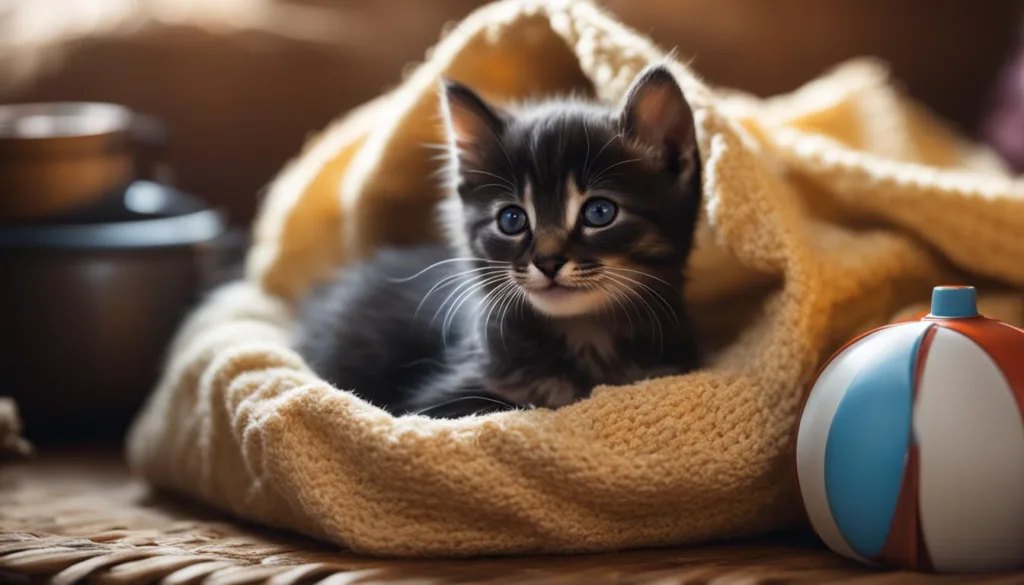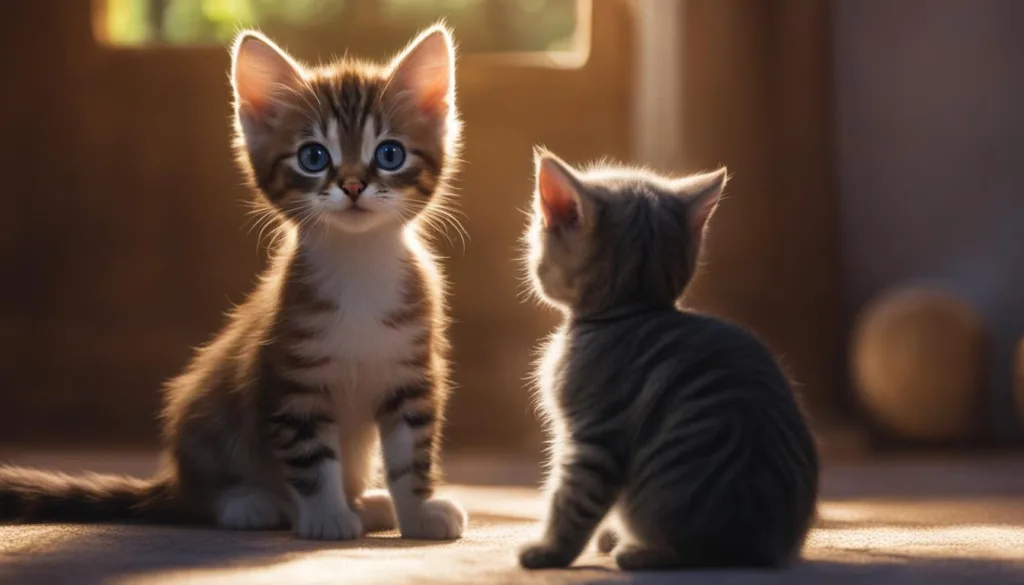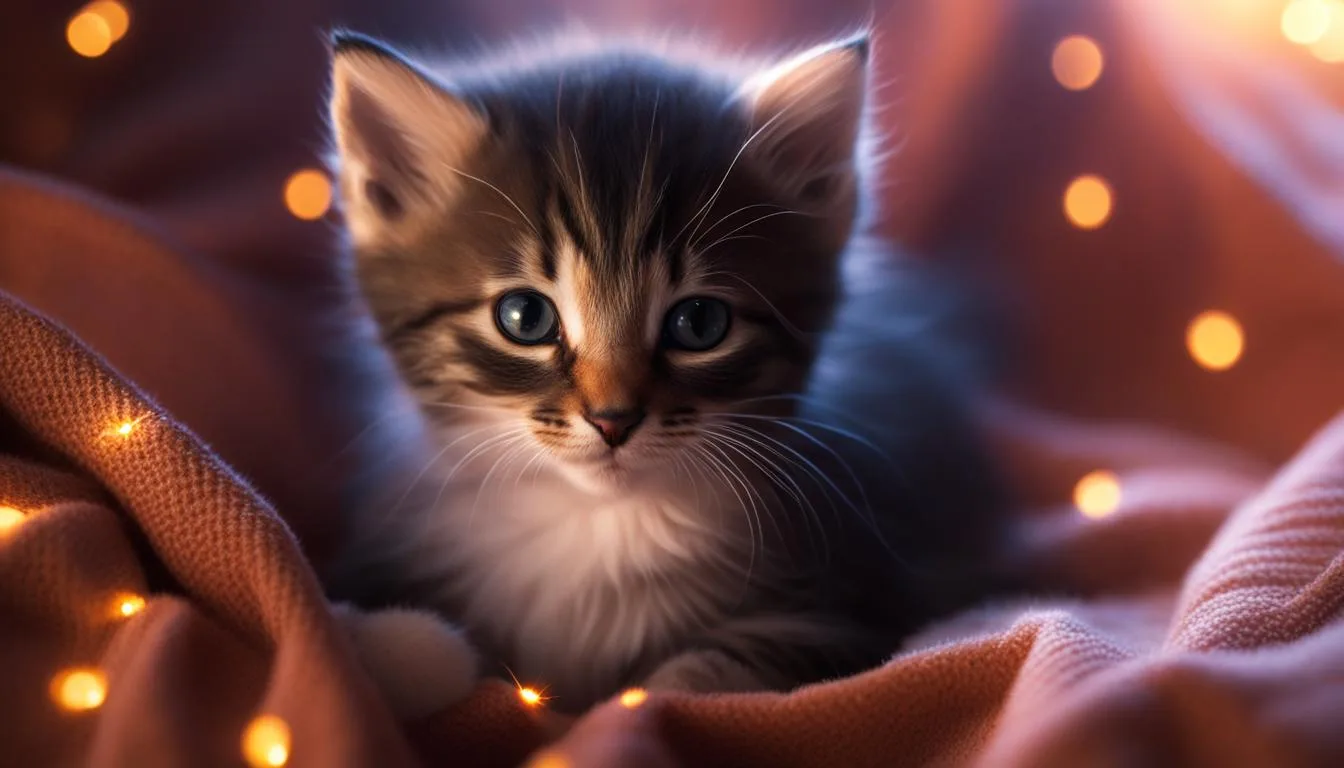Have you ever wondered why kittens purr? It’s a captivating behavior that has fascinated cat owners for generations. While we humans don’t have the ability to purr, our feline friends, including adorable kittens, have a unique talent for producing this soothing sound. In this article, we’ll explore the biology and purpose behind kitten purring, giving you a deeper understanding of this enchanting behavior.
- How Do Kittens Purr? The Biology of Purring
- The Purpose of Kittens Purring
- Reasons Why Kittens Purr
- Do All Kittens Purr?
- Why Do Cats Purr and Then Bite You?
- The Science Behind the Healing Power of Purring
- Cats Purring and Their Bond With Humans
- The Power of Purring in Cats
- The Surprising Range of Purring
- Conclusion
- FAQ
- Source Links
Key Takeaways:
- Kittens have the remarkable ability to purr, which is not present in humans.
- Purring is a form of communication and social bonding for kittens.
- Kittens purr to calm themselves and even promote healing.
- Purring is a versatile behavior influenced by emotions and different situations.
- All kittens can purr, and its absence may indicate a health issue.
How Do Kittens Purr? The Biology of Purring
Kittens purring is an adorable behavior that brings joy to cat owners, but have you ever wondered how and why kittens purr? Let’s explore the fascinating biology behind this unique phenomenon.
Kittens purr thanks to a combination of their larynx (voice box), laryngeal muscles in the throat, and a neural oscillator in their brain. The brain sends a signal to the throat, causing the throat muscles to twitch rapidly. This movement creates an opening and closing of the space between the vocal chords, through which air passes during the process of inhaling and exhaling. These vibrations result in the familiar purring sound that we associate with kittens.
The Mechanism Behind Kitten Purring
To better understand this mechanism, think of a musical instrument. When air passes through a flute or a guitar string, it creates vibrations that produce sound. Similarly, when air passes through the vocal chords of a kitten, the rapid opening and closing of the space between the vocal chords generate vibrations, resulting in purring.
The biology behind kitten purring involves a coordination of their brain, throat muscles, and vocal chords to produce the soothing sound that warms our hearts.
This unique ability to purr is exclusive to cats, including kittens, and sets them apart from other animals. While scientists continue to study the exact purpose and benefits of purring, understanding the biology behind it helps unravel the mystery of this delightful behavior.
The Purpose of Kittens Purring
When kittens purr, it serves several important purposes. Firstly, purring is a form of communication and social bonding. It helps kittens strengthen their bond with their mothers and communicate their presence within the litter. Purring also has a calming effect on kittens, acting as a self-soothing mechanism. The gentle vibrations created by purring release endorphins in the cat’s brain, promoting a sense of well-being and relaxation.
Additionally, purring has been found to have healing properties. The vibrations produced during purring can help stimulate cell regeneration and tissue repair. It can also promote bone strength and alleviate pain in kittens. As a result, purring is not only beneficial for the kittens themselves, but it can also have a positive impact on their human companions.
“Purring is a universal behavior that serves multiple purposes, including communication, bonding, and self-soothing.”
In fact, research has shown that the soothing sound and vibrations of a purring kitten can lower stress levels and reduce blood pressure in humans. Many cat owners find comfort and relaxation in the experience of having a purring kitten on their lap. This gentle and rhythmic behavior creates a sense of companionship and emotional support, contributing to the unique bond between cats and their owners.
The Benefits of Kitten Purring:
- Promotes social bonding
- Acts as a self-soothing mechanism
- Helps kittens communicate their presence
- Stimulates cell regeneration and tissue repair
- Alleviates pain and promotes bone strength
- Reduces stress levels and lowers blood pressure in humans

| Benefits of Kitten Purring | Importance |
|---|---|
| Promotes social bonding | Strengthens the bond between kittens and their mothers, and helps them communicate their presence. |
| Acts as a self-soothing mechanism | Calms kittens and promotes a sense of well-being and relaxation. |
| Stimulates cell regeneration and tissue repair | Can aid in the healing process and promote overall health in kittens. |
| Alleviates pain and promotes bone strength | The vibrations of purring can have therapeutic benefits and promote bone health in kittens. |
| Reduces stress levels and lowers blood pressure in humans | The soothing sound and vibrations of a purring kitten can provide comfort and emotional support to their human companions. |
Reasons Why Kittens Purr
There are several reasons why kittens purr. One of the main reasons is happiness. When kittens are happy and content, they often express it by purring. The soothing vibrations created by the purring sound indicate that the kitten is in a state of comfort and pleasure. So, if your kitten is purring while cuddling with you or playing, it’s a sign that they are feeling happy and secure in your presence.
Purring can also serve as a form of communication. Kittens may purr to express their affection towards their mother, siblings, or even their human owners. It helps them strengthen social bonds and convey their presence. So, when your kitten purrs while snuggling up to you or while being petted, they are essentially expressing their love and attachment.
Another interesting reason why kittens purr is to self-soothe. Purring has a calming effect on cats and can help them relax in stressful situations. If your kitten is scared, anxious, or in pain, they may resort to purring as a way to comfort themselves. The gentle vibrations produced by purring release endorphins in their brain, which can help them feel more at ease and alleviate any distress they may be experiencing.
| Purring Reasons | Explanation |
|---|---|
| Happiness | Kittens purr when they are happy and content. |
| Communication | Purring is a way for kittens to bond and express affection. |
| Self-Soothing | Kittens purr to comfort themselves in stressful or painful situations. |
So, the next time your adorable kitten starts purring, remember that it could be their way of expressing happiness, love, or seeking comfort. Embrace this delightful behavior and cherish the special bond that you share with your furry friend.
Do All Kittens Purr?
Yes, all kittens have the ability to purr. Purring is not limited to specific breeds or individual cats. It is a universal behavior that is present in all domestic kittens. However, it’s important to note that the absence of purring in a kitten may indicate a health issue, and veterinary attention should be sought if necessary.
Purring is a natural instinct in kittens and is believed to have evolutionary origins. It is a way for kittens to communicate and bond with their mothers and littermates. The vibrations produced during purring create a sense of comfort and security, and it is often observed when kittens are content, relaxed, and in the presence of their family.
While all kittens have the ability to purr, the intensity and frequency of purring may vary among individuals. Some kittens may purr more often and louder than others, while some may purr more quietly. It is important to remember that each kitten is unique, and their purring behavior may be influenced by various factors such as age, health, personality, and environment.
| Kitten Purring Behavior | Description |
|---|---|
| Contentment | Kittens often purr when they are happy, relaxed, and feeling secure. |
| Social Bonding | Purring is a way for kittens to bond with their mother and littermates, as well as with their human companions. |
| Self-Soothing | Kittens may purr to calm themselves down when they are stressed, anxious, or in pain. |
| Healing and Recovery | The vibrations produced during purring have been found to have healing properties, promoting bone strength and aiding in the recovery process. |
So, if you have a kitten that doesn’t purr, don’t worry. Just like humans, cats have their own unique personalities and behaviors. As long as your kitten is otherwise healthy and showing signs of contentment, there is no need for concern. Enjoy the special moments you share with your purring kitten and cherish the bond that you have formed.
Why Do Cats Purr and Then Bite You?
Sometimes, kittens may purr and then bite their owners. This behavior can have different meanings. It could be a sign of affection, known as a “love bite,” or it could indicate overstimulation or discomfort. It’s essential to read your kitten’s body language and respect their boundaries to avoid being bitten. Cats will generally communicate their preferences, and it’s best to let them approach you for cuddles rather than forcing it upon them.
Understanding kitten purring behavior is crucial in deciphering why they may sometimes transition from purring to biting. Purring is often associated with a content and relaxed state in cats, but it can also be triggered by different emotions and situations. While purring is generally a positive behavior, it doesn’t necessarily mean that a kitten is always happy or pleased. It’s important to pay attention to their overall body language and context to fully interpret their intentions.

One possible reason why kittens purr and then bite is because of overstimulation. When petting a kitten, it’s essential to be mindful of their comfort levels and stop if they show signs of being overwhelmed. Tail flicking, flattened ears, and dilated pupils can indicate that a kitten may be reaching their threshold and could potentially react by biting. It’s important to respect their boundaries and give them space when needed.
The Science Behind the Healing Power of Purring
When your kitten purrs, it’s not just a delightful sound—it’s also a powerful healing mechanism. The vibrations generated by purring have been found to have remarkable therapeutic properties. These vibrations can promote bone strength, alleviate pain, and even aid in the healing of injuries.
The frequency range of purring is believed to have specific benefits for the body. Research suggests that the vibrations produced during purring can stimulate cell regeneration and tissue repair, contributing to the healing process. In fact, some studies have shown that the vibrations of a purring kitten can lead to faster healing of fractures and reduced recovery time after surgery.
Additionally, the act of purring has a calming effect on the cat itself, reducing stress levels and promoting an overall sense of well-being. This stress reduction can have positive effects on the cat’s health, as chronic stress is known to weaken the immune system and contribute to various health issues.
| Healing Benefits of Kitten Purring |
|---|
| Promotes bone strength |
| Alleviates pain |
| Aids in tissue repair |
| Reduces stress levels |
| Stimulates cell regeneration |
So the next time your kitten curls up on your lap and starts to purr, appreciate the incredible healing power behind this adorable behavior. Not only is it a sign of contentment and affection, but it’s also a natural way for your kitten to take care of its own health and well-being.
Cats Purring and Their Bond With Humans
Understanding the behavior of kittens purring is not only fascinating from a scientific perspective but also essential for cat owners. The act of purring goes beyond a simple vocalization and holds significant importance in the bond between cats and their human companions. When a kitten purrs while curled up on your lap, it creates a sense of comfort and relaxation for both of you.
The vibrations and soothing sound produced during purring have been found to have numerous health benefits for humans. Research has shown that experiencing a kitten’s purring can lower stress levels, reduce blood pressure, and even provide emotional support. The gentle vibrations created by a purring kitten can create a calming effect and a sense of companionship.
But the bond between cats and humans goes beyond the physical benefits of purring. Kittens purr to communicate and strengthen social bonds. When your kitten purrs, it is an expression of contentment, happiness, and trust. It’s their way of letting you know that they feel safe and loved in your presence. By understanding the importance of kitten purring, you can deepen your connection with your furry friend and provide them with the care and companionship they need.
In conclusion, the act of purring is not just a simple behavior; it is a powerful tool for communication and bonding between kittens and their human companions. The soothing vibrations and sound of purring can have numerous health benefits for both cats and humans. So, the next time your kitten curls up on your lap and starts to purr, embrace and appreciate the magic behind this adorable behavior.
The Power of Purring in Cats
Kittens purring is not just a cute and comforting behavior; it also has numerous benefits for their health and well-being. Understanding the facts and benefits of kitten purring can help you appreciate the power behind this delightful sound.
When kittens purr, their bodies produce gentle vibrations that have been found to have therapeutic effects. The frequencies and vibrations created by purring can promote bone strength, alleviate pain, and aid in the healing process. These vibrations are believed to stimulate cell regeneration and tissue repair, making purring a natural form of self-healing for kittens.
Not only does purring benefit kittens, but it also has positive effects on their human companions. The soothing sound and vibrations of a purring kitten can help lower stress levels, reduce blood pressure, and provide a sense of comfort and relaxation. Owning a cat and experiencing their purring has even been linked to reduced risk of strokes or heart disease and improved mental well-being for humans.
| Purring Benefits for Kittens | Purring Benefits for Humans |
|---|---|
| Promotes bone strength | Reduces stress levels |
| Alleviates pain | Lowers blood pressure |
| Aids in the healing process | Provides a sense of comfort and relaxation |
| Stimulates cell regeneration | Improves mental well-being |
So the next time your kitten curls up in your lap and starts purring, take a moment to appreciate the remarkable power behind this behavior. Not only is it a sign of contentment and affection, but it also holds the potential to positively impact both your kitten’s health and your own well-being.

The Science Behind Purring
“Purring is an innate behavior in kittens that is triggered by a combination of their brain and physiological mechanisms. The neural oscillator in their brain sends signals to the muscles in their throat, causing rapid contractions and relaxation. This results in the vibrations and soothing sound that we associate with purring.”
Understanding the science behind purring helps us appreciate its significance and the profound effects it can have on both kittens and humans. Whether it’s promoting healing or providing comfort, the power of purring is undeniable.
The Surprising Range of Purring
Did you know that purring is not exclusive to domestic kittens? Other members of the Felidae family, such as bobcats and cheetahs, also possess this unique ability. However, larger cats like lions, tigers, jaguars, and leopards do not purr due to differences in their vocal anatomy.
Interestingly, purring or similar behaviors can also be observed in some animals outside the Felidae family. Bears, foxes, and even rabbits have been known to produce purr-like sounds. While the exact reasons behind these behaviors in non-feline species are still being studied, it is clear that purring or similar vocalizations serve different purposes across various species.
So, next time you hear a kitten purring, remember that this adorable behavior is not just limited to your furry companion. Purring transcends species boundaries and showcases the fascinating diversity of nature’s vocalizations.

Conclusion
Kittens purring is a complex behavior that serves multiple purposes. It is a means of communication, social bonding, self-soothing, and even healing. The vibrations and frequencies produced when kittens purr have therapeutic benefits for both themselves and their human companions.
The remarkable ability of kittens to purr enhances the unique bond between cats and their owners, providing comfort, relaxation, and joy. So next time your kitten purrs, appreciate the magic behind this adorable behavior.
FAQ
Why do kittens purr?
Kittens purr as a form of communication and social bonding. It helps them strengthen their bond with their mother and express their presence. Purring also serves as a self-soothing mechanism and can promote healing and a sense of well-being.
How do kittens purr?
Kittens purr thanks to the combination of their larynx, laryngeal muscles in the throat, and a neural oscillator in their brain. The brain sends a signal to the throat, causing the throat muscles to twitch rapidly. This movement creates an opening and closing of the space between the vocal chords, resulting in the familiar purring sound.
Do all kittens purr?
Yes, all kittens have the ability to purr. Purring is a universal behavior that is present in all domestic kittens. However, the absence of purring in a kitten may indicate a health issue, and veterinary attention should be sought if necessary.
Why do cats purr and then bite you?
Sometimes, a kitten may purr and then bite their owner. This behavior can have different meanings. It could be a sign of affection, known as a “love bite,” or it could indicate overstimulation or discomfort. It’s important to read your kitten’s body language and respect their boundaries to avoid being bitten.
What are the healing properties of purring in kittens?
The vibrations and frequencies created when kittens purr have therapeutic benefits. Purring can promote bone strength, alleviate pain, aid in the healing process, and stimulate cell regeneration and tissue repair. It can also have a calming effect on the cat, reducing stress levels and promoting overall well-being.
How does purring in kittens benefit humans?
The soothing sound and vibrations of a purring kitten can help lower stress levels, reduce blood pressure, and provide a sense of comfort and relaxation for their human companions. Cat owners have reported reduced risk of strokes or heart disease and improved mental well-being.
Can other animals purr like kittens?
Purring is not exclusive to domestic kittens. Other members of the Felidae family, such as bobcats and cheetahs, can also purr. However, larger cats like lions, tigers, jaguars, and leopards do not purr due to differences in their vocal anatomy. Some animals outside the Felidae family, such as bears, foxes, and even rabbits, can produce purr-like sounds.




